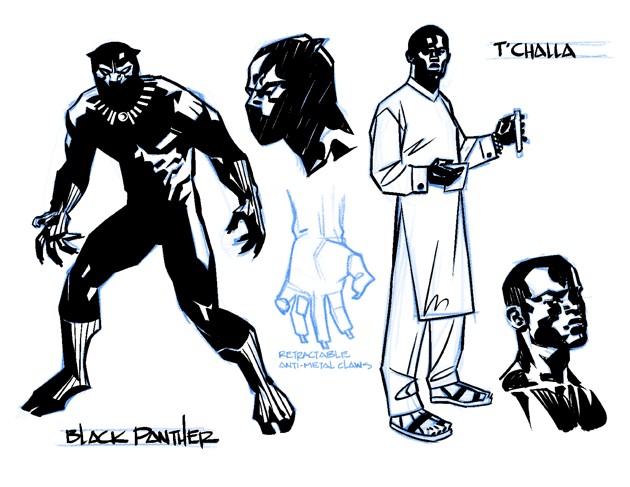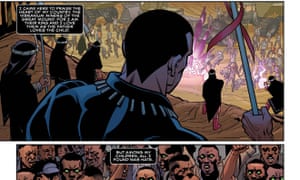Marvel Comics has often turned to writers, famous beyond the world of capes and comics, to reinvent their lesser-known and lesser-loved titles. The novelist Jonathan Lethem, who put Marvel’s 1970s output front and center in both Fortress of Solitude and his autobiographical book of essays The Disappointment Artist, wrote a self-contained 10-issue series for the virtually forgotten Omega The Unknown in 2007. While G Willow Wilson, a comic book and fantasy writer most famous for her novel Alif the Unseen, transformed Ms Marvel into the first major Muslim superhero.
Now, Ta-Nehisi Coates, who went from his influential blogs and features at the Atlantic to the MacArthur fellowship, and the National Book Award, is helming a new run of Black Panther. If you’ve never heard of Black Panther, that’s about to change. Not only will he soon be incorporated into the Marvel cinematic universe in the new Captain America film, but Coates’s first issue of the comic has already hit sales of more than 300,000 copies, more than twice the demand for the previous month’s bestselling comic, Dark Knight III.
Black Panther has been through this process once before, when mystery novelist David Liss had the character take over for Daredevil and move to Hell’s Kitchen. The results were a kind of poor man’s Batman – right down to the goofy gadgets and a conflicted relationship with a mustachioed police officer he met on rooftops. Somehow, it still worked. Never a prominent enough character to have the fixed mythology and reader expectations of a Spider-Man or a Batman, Black Panther’s exact backstory, powers, code of conduct and attitude have all shifted many times over the 40 years that he’s been punching evildoers in the face.
There are certain constants, however. The Black Panther isn’t a secret identity, it’s a ceremonial title that belongs to T’Challa, the king of the fictional African nation of Wakanda. The Black Panther is Wakanda’s king, the high priest of its Panther cult, and its warrior champion all at once. In some versions of his story, the title is hereditary, in others it is won by combat every year, but either way, the Black Panther eats a heart-shaped herb as part of his initiation which brings him into touch with the Panther god and grants him some superpowers.
Wakanda is the most technologically advanced nation in the world. It is also one of the wealthiest, thanks to the Great Mound, a meteor made out of vibranium that crashed into its territory eons ago. Before T’Challa’s reign, Wakanda was an isolationist country that many had never heard of, a secret African utopia that married tribal customs – or white writers’ ideas of tribal customs – to space-age science fiction.
T’Challa has often left Wakanda for one reason or another, and brought trouble back with him. Over the years, T’Challa has jump-kicked the Ku Klux Klan, hunted treasure, joined up with the Avengers, married an X-Man, survived multiple invasions from the neighboring state of Niganda, abdicated his throne, filled in for Daredevil in Hell’s Kitchen, taught in a public school in Harlem, been divorced and staked the hearts of dozens of Confederate vampires in post-Katrina New Orleans. Throughout all this his essential decency has remained intact. In some writers’ hands, T’Challa is arrogant – wouldn’t you be if you ruled a techno-futurist Utopia? – but he is always, at heart, a good man. T’Challa is, no matter what, a beloved, merciful, and just ruler, possessed of a personal sense of restraint and duty.
The Black Panther’s rule of Wakanda hasn’t been seriously interrogated by the various writers who have told his story. It is this aspect that feels most fresh about Coates’s take on the character. The comic begins with T’Challa on his knees, unmasked, continues on to a civilian riot where he nearly kills his own citizens, through to a botched attempt at justice, and a mysterious psychic informing us that the people of Wakanda are ashamed of their king. This mysterious psychic is in some way responsible for the riot, but she did not create the emotions that caused it; the people’s own rage lay there, waiting to be exploited.
Coates may be a first-time comics writer whose entire published catalogue thus far is nonfiction, but he attacks the material with aplomb. The debut issue is the first in a yearlong, 12-chapter arc. It is a bit overburdened with exposition. But it moves fluidly, lighting the fuses of several plots that will clearly intersect before detonating in the finale.
Emphasizing the wide scope of the series, Coates’s script sets T’Challa aside for long stretches of action, focusing instead on characters like Ayo and Aneka, two ex-Dora Milaje who are “tired of living and dying on the blood-right of one man”. While the dialogue is occasionally overcooked, with lines such as, “Spare her, mother, spare her the bastard sanction of men whose honor is ostentation, whose justice is deceit,” failing to grasp the epic grandeur for which they reach, this first issue appears to be the beginning of a very promising run.
The characters are clear, the ethical issues they face feel real and the world of Wakanda seems lived in. Credit for some of this must surely go to artist Brian Stelfreeze, whose sense of style and visual storytelling are impressive, even in the heat of battle, and who makes great use of silhouette and emotive faces. These faces are neatly contrasted with T’Challa’s own, which is often hidden by a mask or turned away from the reader. We read T’Challa’s anguished narration, but he is separate from us in a way reminiscent of how he feels divorced from his people and his nation.
It’s a subversive way of looking at Black Panther and long overdue. Marvel Comics has often opened the doors for subversive takes on their titles. One of the best long-running comics series ever published, Brian Michael Bendis and Alex Maleev’s take on Daredevil, was the result of a similarly realistic consideration of the world of the character that their predecessors had built. The Black Panther has faced down threats to his rule on multiple fronts before. In Coates and Stelfreeze’s hands, the comic suggests that this time, maybe he deserves it.
Ta-Nehisi Coates’s Black Panther: A Powerful Symbol for the Black Lives Matter Generation
The acclaimed cultural commentator has penned a limited series of Marvel’s African superhero, and the timing couldn’t be better.
“You have no people. You are no longer my son.”
The first issue of the much-hyped, Ta-Nehisi Coates-penned Black Panther limited series landed at comic book shops this Wednesday, with fans of the titular character and fans of one of America’s most visible cultural commentators clamoring to see what Coates can do with Marvel Comics’ second most mythic African character (Storm still holds a special place in the public’s collective heart and in Marvel lore.) With the superhero set to make his motion picture debut in May alongside Captain America, Iron Man, Black Widow, and the rest of the Avengers in Captain America: Civil War, and with a Ryan Coogler-helmedBlack Panther film slated for 2017, all eyes are on T’Challa right now.
“A Nation Under Our Feet” opens with Black Panther tormented by his own feelings of failure and regret, struggling with issues of identity and responsibility. Wakanda is in turmoil and support for T’Challa at low ebb, raising the question of what happens if his people reject him. In one of the issue’s most compelling moments, T’Challa’s stepmother, Ramonda, conveys to the frustrated hero that intelligence must inform all action—and that the burden of leadership is heavy. But he’s confused and angry. The country is on the brink of civil war, and Black Panther himself may resort to desperate measures to resolve the bloodshed.
Because of Coates’s status as one of the more high-profile commentators on race in America, it’s hard not to read a lot of it as an allegory for the conflicting elements that contribute to so much of the black experience—a legacy of righteous rebellion born of oppression’s weight. And this character and story is the perfect vessel to address and examine those realities.



